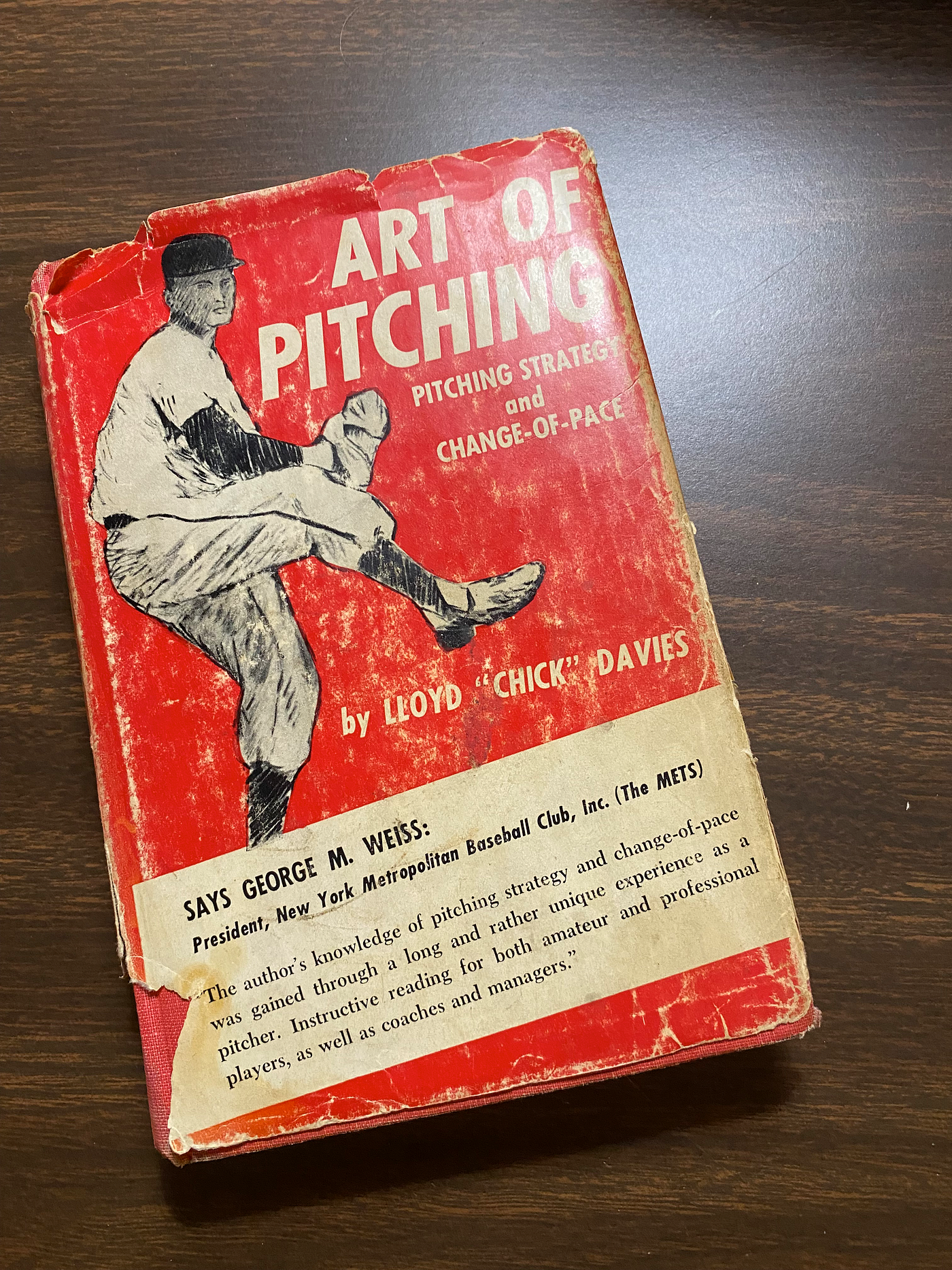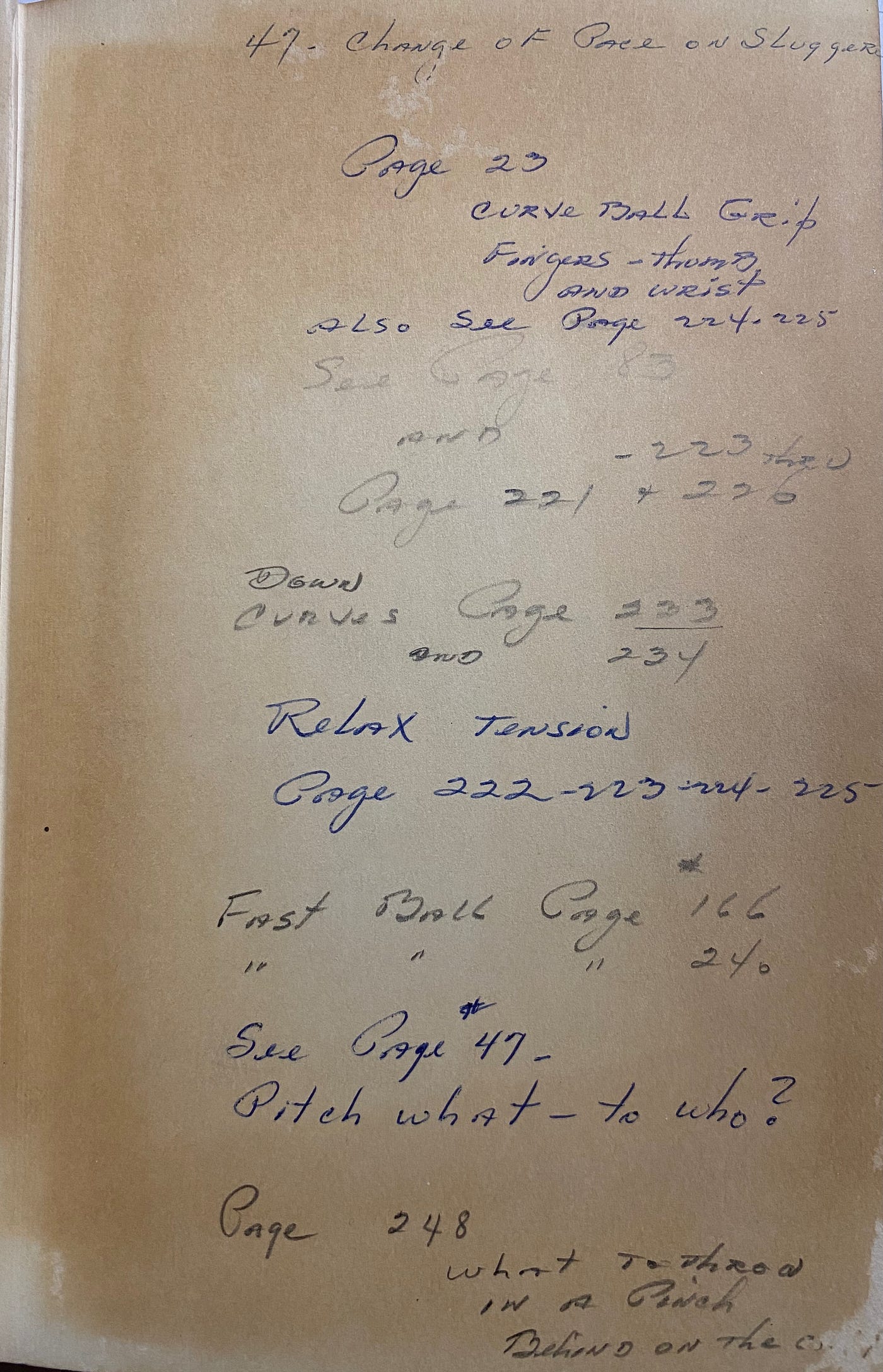A Major League Ballplayer Who Quoted Shakespeare at the Umpire
A Major League Ballplayer Who Quoted Shakespeare at the Umpire
And who happened to be my mother’s uncle
HISTORY

Lloyd Garrison “Chick” Davies was an unusual baseball player. He only played four widely separated seasons in the major leagues and four more in the minors, but he did distinguish himself playing for the New York Giants in the 1926 World Series, leading the National League with 6 saves and 29 games finished. He also happened to be my great-uncle.
See below for an update that explains that he did not play in the 1926 World Series but did play against Babe Ruth, Ty Cobb, and Shoeless Joe Jackson.
Oh, and he wrote a book about pitching. I vaguely remember seeing a copy of it when his sister, my grandmother, lived with us after her husband died. I wasn’t interested then in pitching or great-uncles I had never met; I wish now that I had been.
My quest
I recently bought a well-worn copy of that book, titled “Art of Pitching”, for $55.00 on eBay. I had been looking for a copy for several years now, but it usually sells for hundreds of dollars, and I didn’t want to pay that much. I snapped up that $55 book instantly, hoping that it would give me more information about a man I never knew.
The book is in poor condition, as expected. The cover is ripped and tattered, and its pages are marked up with notes, underlines, and brackets. It looks like it may have been used by a coach telling some unknown reader which parts to read first. I suppose that coach could have been Chick himself, but I only have one sample of his signature to compare, and that’s insufficient.


But it added to what I had, which was a recounting of her family by my mother and what often conflicting information I could find on the internet.
Baseball
I have no knowledge of pitching, baseball, or any sport. I played pickup baseball, basketball and football with other kids in the neighborhood, but never had any greater interest. My father took me to a baseball game once; I was thoroughly bored. I had to call my brother-in-law to help me understand a lot of what I read while researching this!
My mother did have that interest. The reason for that was, I assume, was because of her uncle. I lack any memories of her listening to baseball, watching it, or even talking about it, but my older sister (@oldsal8904 here) says that our mother watched “baseball, golf and horse racing.”
Family History
I don’t care much about genealogy, but family history is interesting. There are so many questions I wish I had asked my elders while they were still alive; questions I have no hope of resolving now. I’ve also been amused by researching what bits of family lore I can and finding that some of it is perhaps dubious at best. What passes down over generations is often warped or even completely wrong.
That’s why I wanted the Art of Pitching book. I hoped that it might fill in some history about a relative I don’t think I ever met — if I did, I was too young to remember or at least too young to remember who I met.
Uncle Chick
My mother dictated her family memories to my sister in the mid nineteen nineties. My mother was in her mid-eighties then; here I’m only reporting what was related to Lloyd — or “Chick” as she and her mother referred to him.
In my mother’s account, it was Connie Mack (an owner and manager of the Philadelphia Athletics) who gave Lloyd the nickname “Chick”. I have some reservations about that because I remember my grandmother — his two year younger sister — referring to him as “My Chick.” It seems odd to me that she would pick up that name from his baseball career, but perhaps she did. It’s also perhaps odd that in Art of Pitching, Chick tells of Mack referring to him as “Lefty” more than once but never mentions “Chick”. I think it was a family nickname.
I was picking out a bat, expecting that Mr. Mack would use a pinch
hitter, when he said to me, “Can you hit southpaws, Lefty?” “I think so,” was my not-too-confident reply. “Well go in there and win your own game,” he said. I did.After the game, Mr. Mack said to me, “Nice pitching, Lefty, but now I know you’re going to be an outfielder.”
An early start in baseball
Chick had a brother, Basil, eight years older. In Art of Pitching, Chick mentions that Basil fostered his interest in baseball:
I was a grammar school kid at the time, when my oldest brother took me to Lynn, Mass., to see that club play Fall River.
It’s interesting that Chick refers to his “oldest brother”. He had only one other brother, an unnamed stillborn boy born in 1880 (four years before Basil). Perhaps that’s why, or simply a misuse of “oldest”, but Chick’s writing otherwise has excellent grammar. Tangential to that is a comment by Henry Sullivan (a Sports writer) in the Art of Pitching’s Foreword about Chick and the third baseman arguing with an umpire:
Both players were college graduates of high standing and were gentlemen of the finest type. But they could and did vociferate and gesture vehemently. Looked as if they were calling the umpire everything. But no! Nothing like that. They were, more likely, quoting Shakespeare. At times I did get the good ear close enough to hear glowing fragments of the erudite Davies-Nash remarks. And I still think that those baseball masterpieces of diction could be built up into or calmed downward to a top-class theatrical offering.
I certainly wish there were recordings of that!
Basil is also mentioned in my mother’s account:
[She remembers] Uncle Basil coming in from the Bleachery at lunchtime and leaning over the kitchen sink to soak his head under the running faucet. She recalls him as being a handsome man with an unfortunate drinking problem.
Basil’s drunken spells would frighten his younger sisters who would
barricade themselves behind bedroom doors. At some point in his life, he
fell in love and stopped drinking with the aid of therapy. He married Annie
Toomey (b.1904 d.1990) and was happily married for ten years. Basil
died in middle age.
Connie Mack offered him a contract while Chick was still in college, playing baseball for University of Massachusetts, Amherst. Wikipedia tells us that Connie preferred his players to have “physical ability, intelligence, courage, disposition, will power, general alertness and personal habits.”
Chick’s first major league game was September 3rd, 1914 at Fenway park. I found a “Chick Davies Day” card on eBay,

I bought the card. The seller (ebay link nybigfan) graciously sent me more information about Chick:
I am very happy that this [the First Day card] found it’s way home. Many years ago I researched your great uncle. I have not read your story yet and it was many years ago ( I have owned this for over 40 years) but this is what I remember. Your great uncle was picked up by Connie Mack and came up for one game of a double header on July 11th 1914 vs The St Louis Browns; he pitched a complete game win!! He came up the next year. His First game he pitched against Babe Ruth …he lost that one. But that game was the very first game that Babe Ruth pitched!! Your great uncle pitched against Babe Ruth in his very first game. Next game vs Detroit 5/21 and Ty Cobb he won his only game of that season 11 to 8. He stuck around with the big club pitching in his next game vs Clevland 5/27 and Shoeless Joe Jackson!! Two more games that year 6/29 and 9/29 both vs Washington.
Then back to school and chemistry until 1925 John Mcgraw in need of pitching picks up your great uncle in 1925 and his first game 9/23 he faces Hall of Famer Jessie Haines the second time he faces a hall of Famer and comes away with loss… But he rebounds on 9/29 with a win over Brooklyn. Then in 1926 he spends the year with the Giants appering in 38 games including once in both games of a double header. And now he has the bug despite not being picked up in 27 by the Giants he signs with Newark in the international leauge. A solid club and he spends next 4 years in minors hoping for one more call up…
I asked if I could publish what he said. He responded:
Tony I read your story … first sorry to say your great uncle did not play in the world series in 1926. The St.louis Cardinals played in 26. And in 1925 it was Pittsburgh. He did play on the 1914 A’s who did win pennant and play in 1914 world series. And your uncle was part of that team.
That being said him being the very first pitcher to face Babe Ruth is a big deal. A very big deal. As well as pitching vs Ty Cobb and Shoeless Joe Jackson.
Of course you can add any of the info I sent to your story. If you like I will proofread to insure you got it right. And If I were you I would add the box score of the Babe ruth game to the story. As I said a few times it is a big deal. And although I knew he pitched in 1915 ( Ruth’s rookie year) until today I did not put that together.
That game was April 26th, 1915 at Fenway Park. According to BaseballReference.com, it was a day game, on grass (of course), and lasted an hour and forty-five minutes. The Philadelphia Athletics lost to the Red Sox (Babe Ruth’s team) 2–9.
According to Harriette, her brother Harlan resembled Lloyd in looks, but not in personality. She recalls that Lloyd was spoiled rotten as a young man.
The “spoiled rotten” may have been just a sign of the times. Male children were more likely to be educated than females, and Chick was the youngest boy. Chick’s father was an educated man, as was Chick, and perhaps Basil. His sister Ida Mae, my grandmother, never went to college; I don’t know if the other sister Eva (born 1881, three years before Basil) did, but it was not uncommon for women to not attend college then.
After his pitching career for the Philadelphia Athletics was over, he sold bonds. He married a sweetheart of a woman, Marion Shaw, who was a brilliant mathematician, graduating from Mt. Holyoke with highest honors. She was so skilled that she tutored Yale students in math. She supported the family after Chick’s baseball career was over.
I have no other reference to Chick selling bonds, but plenty of evidence that he was still playing and coaching.
Why did he quit?
My mother was wrong that Chick’s career was over after playing for Philadelphia. He played in the minors for New Haven in 1920, was back in the majors with the New York Giants in 1925 and 1926, and back to the minors for Newark from 1927 to 1929. He also played for a number of independent teams every intervening year.
His career spanned the introduction of the “lively ball”, a change that created more home runs and demanded more skill from pitchers. He talks about that change a great deal in his book and includes his conversations with an unidentified younger pitcher he calls “Al”.
In Art of Pitching, he says he left the Athletics for “personal reasons”, but does not elaborate. Another source says that Connie Mack “offered Davies another contract for the next year, but he didn’t offer him any more money.”
Davie’s first child was born in 1917. Was that the “personal reason”? He had two more children, born in 1922 and 1925.
Why would he sell bonds? Perhaps he did sell bonds, but he was definitely playing baseball all of this time.
In his book's Foreword, Henry Sullivan also said:
As a fugitive from the big leagues — he retired voluntarily from
the Philadelphia Athletics in 1916 - he influenced many others to
quit the majors for various reasons. More than any other one
person, he not only was largely responsible for raising the calibre
of play in this class of baseball, but he was also responsible for
raising the standard of salaries for the other players in independ-
ent baseball. Perhaps that may explain his popularity both with
his own teammates and those whom he opposed.
There are many references in Chick’s book that imply he was coaching players; perhaps not officially for the team, but informally. There’s no reason to think he wasn’t paid for that. Adding to that thought is that Chick seems to have been driven by money.
Seven games in seven days
Baseball players were not paid badly in those years. I have found nothing that tells me Chick’s salary, but what I have found is that player salaries may have ranged from $5,000 to $15,000 back then. That’s at least $80,000 on the low-end today, and much, much more on the high end.
But Chick wasn’t satisfied with that. From the Foreword again:
.. when “Chick’ was not on the mound for Salem he was on the firing step for some other team. Baseball statistics collected by me (borrowed by others, years ago, and never returned) showed that, over one stretch of time, Davies
pitched seven full games in as many days.
And from Chick himself:
For example, after pitching in Salem, Mass., on a Saturday afternoon, I would hop a train that night in Boston and arrive in Montreal the next morning. A young French youth would meet me, and we would drive a hundred miles or so up the St. Lawrence to Trois Rivière or Grand Pré, where I would pitch on Sunday afternoon.
This would have been while he was playing for independent teams.
Stamina
Chick attributed his physical stamina (they seldom used relief pitchers in those days) to working his shoulders at the YMCA. He had this to say:
I doubt if there is a better way for a young pitcher to keep in shape, and attain the all-round development of his muscles than to spend as much time as possible in a gymnasium. The writer, though fairly small in stature, acquired much of his muscular development and coordination from the exercises and gymnastics practiced in a gymnasium. Even during my later years in baseball, I would join the men’s class in a Y.M.C.A. during the winter months.
And:
I don‘t believe in getting on that rubbing table as often as some of our pitchers do. And although I do not think our modern pitchers, is a whole, are going soft, I do think that many of them are mistaken in their attitude toward keeping in training. You can’t train on gin fizzes and beer.
Chick died in 1973. His book did give me insights into his personality and intelligence.

Comments
Post a Comment